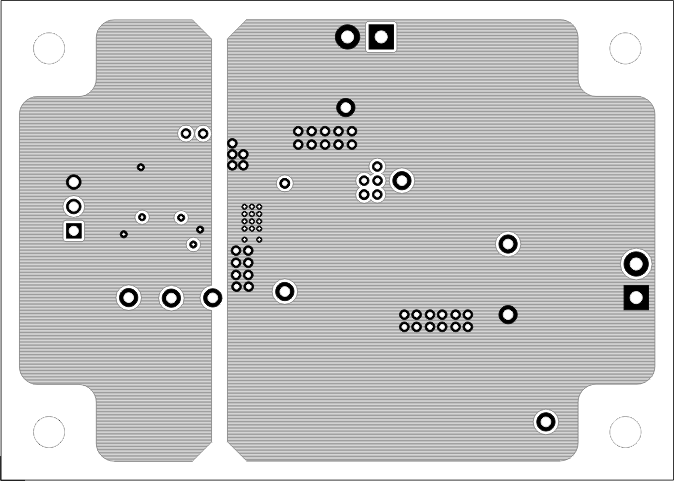SLVU382A August 2010 – September 2021 TPS54425
5.1 Layout
The board layout for the TPS54425EVM-608 is shown in Figure 5-1 through Figure 5-6. The top layer contains the main power traces for VIN, VO, and ground. Also on the top layer are connections for the pins of the TPS54425 and a large area filled with ground. Many of the signal traces also are located on the top side. The input decoupling capacitors are located as close to the IC as possible. The input and output connectors, test points, and most of the components are located on the top side. R3, the 0-Ω resistor that connects VIN to VCC and R4, the power good pull up, are located on the back side. Analog ground and power ground are connected at a single point on the top layer near pin 5 of the TPS54425. The internal layer 1 is a split plane containing analog and power grounds. The internal layer 2 is primarily power ground but also has a fill area of VIN and a trace routing VCC to the enable control jumper JP1. The bottom layer is primarily analog ground but also has traces to connect VIN to VCC through R3, traces for the power good signal, and the feedback trace from VOUT to the voltage setpoint divider network.
 Figure 5-1 Top Assembly
Figure 5-1 Top Assembly Figure 5-2 Top Layer
Figure 5-2 Top Layer Figure 5-3 Internal Layer 1
Figure 5-3 Internal Layer 1 Figure 5-4 Internal Layer 2
Figure 5-4 Internal Layer 2 Figure 5-5 Bottom Layer
Figure 5-5 Bottom Layer Figure 5-6 Bottom Assembly
Figure 5-6 Bottom Assembly